International Management Report: Cultural Effects on Corporate Culture
VerifiedAdded on 2023/06/05
|11
|3810
|73
Report
AI Summary
This report delves into the complexities of international management within a global business consulting company operating across multiple countries. It examines the critical effects of regional cultural issues on corporate organizational culture, including language barriers, differing business practices, labor demographics, and religious differences, and how these can impact business operations. Furthermore, the report critically analyzes the factors that contribute to the success and failure of global virtual teams, referencing a Harvard Business Review study that highlighted the high failure rate of such teams. It explores the key elements for successful virtual team management, including team composition, team size, and the importance of effective leadership, communication, and cultural sensitivity, providing insights into how organizations can improve employee productivity and achieve their goals in an increasingly competitive global market.
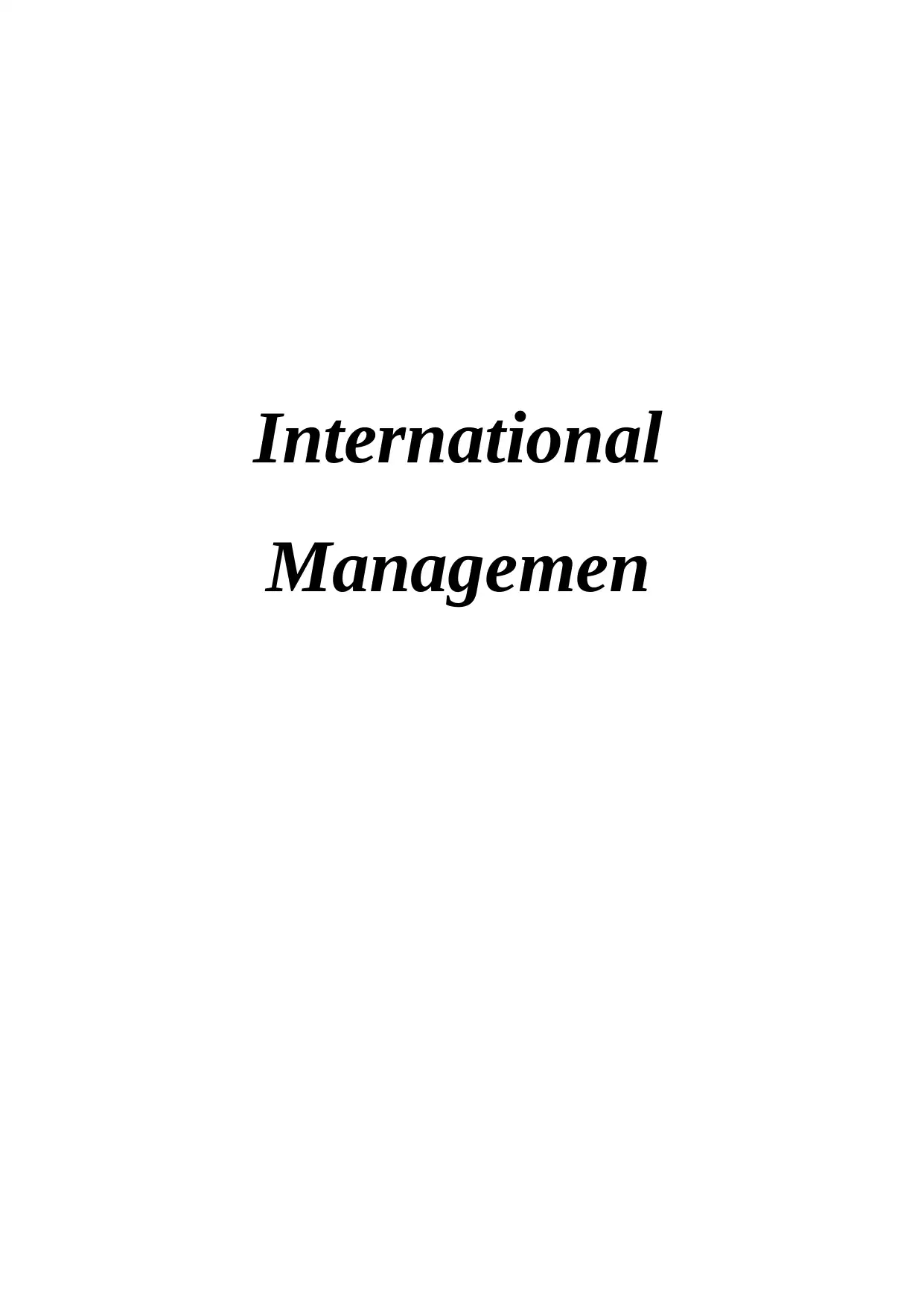
International
Managemen
Managemen
Paraphrase This Document
Need a fresh take? Get an instant paraphrase of this document with our AI Paraphraser
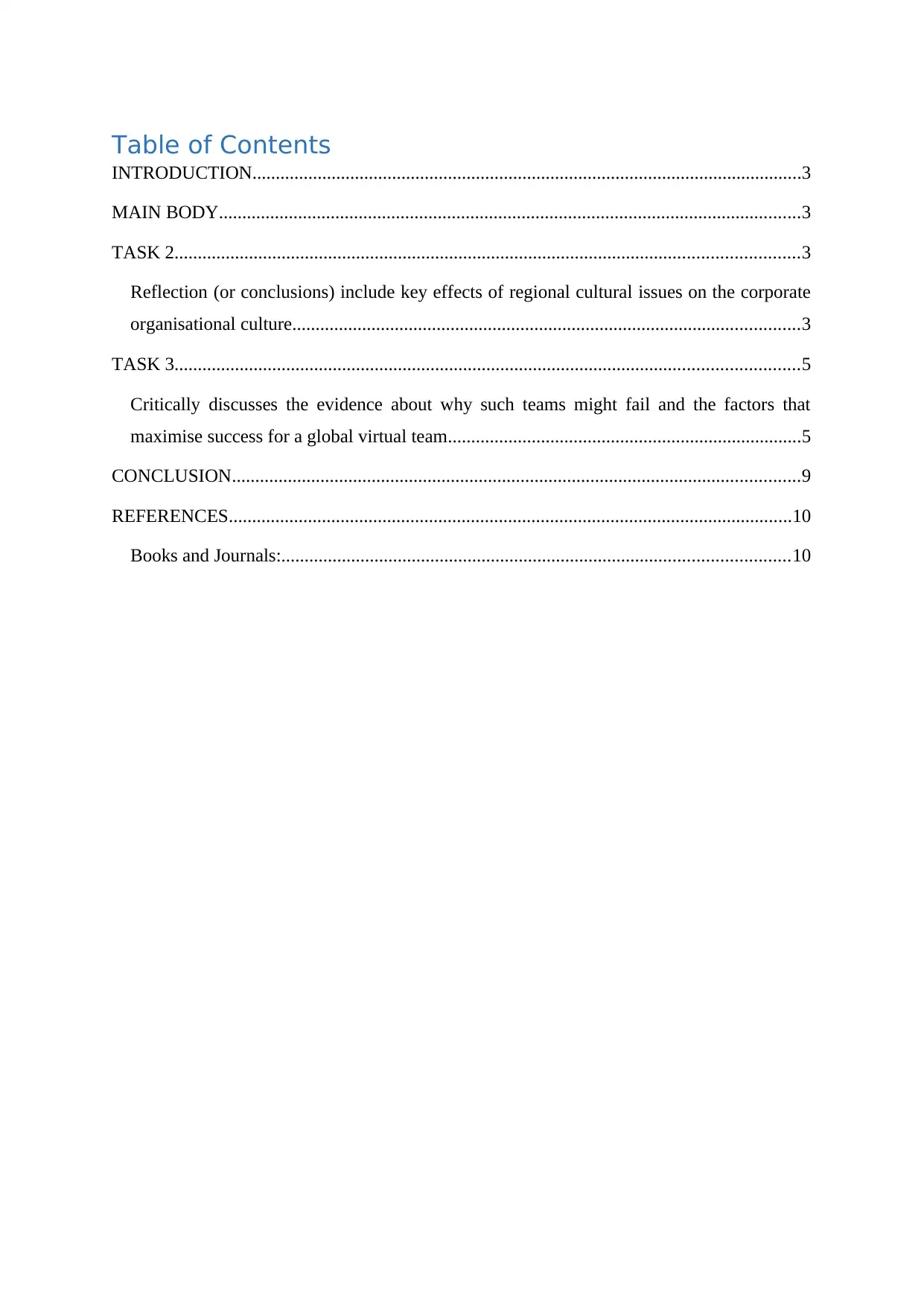
Table of Contents
INTRODUCTION......................................................................................................................3
MAIN BODY.............................................................................................................................3
TASK 2......................................................................................................................................3
Reflection (or conclusions) include key effects of regional cultural issues on the corporate
organisational culture.............................................................................................................3
TASK 3......................................................................................................................................5
Critically discusses the evidence about why such teams might fail and the factors that
maximise success for a global virtual team............................................................................5
CONCLUSION..........................................................................................................................9
REFERENCES.........................................................................................................................10
Books and Journals:.............................................................................................................10
INTRODUCTION......................................................................................................................3
MAIN BODY.............................................................................................................................3
TASK 2......................................................................................................................................3
Reflection (or conclusions) include key effects of regional cultural issues on the corporate
organisational culture.............................................................................................................3
TASK 3......................................................................................................................................5
Critically discusses the evidence about why such teams might fail and the factors that
maximise success for a global virtual team............................................................................5
CONCLUSION..........................................................................................................................9
REFERENCES.........................................................................................................................10
Books and Journals:.............................................................................................................10
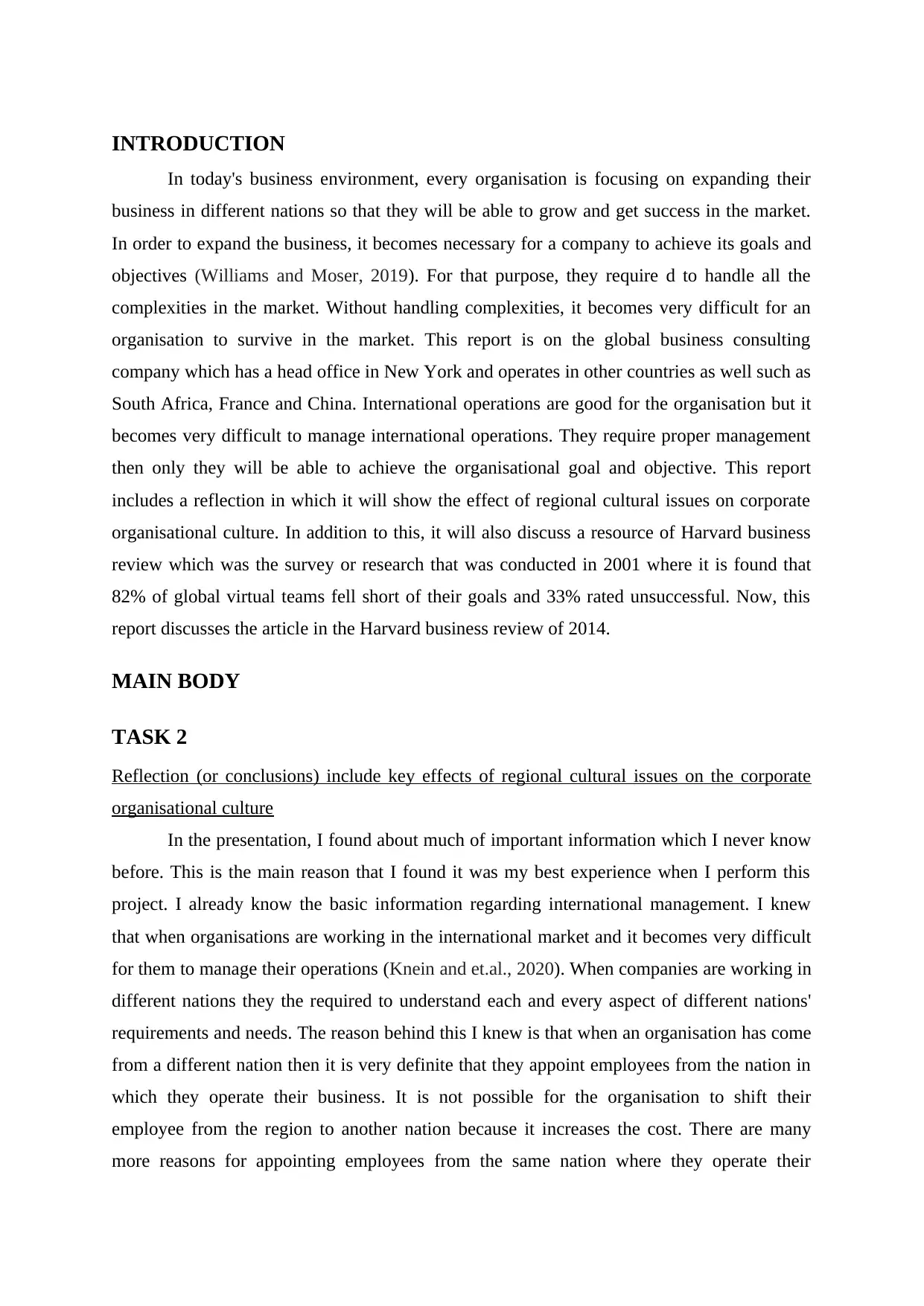
INTRODUCTION
In today's business environment, every organisation is focusing on expanding their
business in different nations so that they will be able to grow and get success in the market.
In order to expand the business, it becomes necessary for a company to achieve its goals and
objectives (Williams and Moser, 2019). For that purpose, they require d to handle all the
complexities in the market. Without handling complexities, it becomes very difficult for an
organisation to survive in the market. This report is on the global business consulting
company which has a head office in New York and operates in other countries as well such as
South Africa, France and China. International operations are good for the organisation but it
becomes very difficult to manage international operations. They require proper management
then only they will be able to achieve the organisational goal and objective. This report
includes a reflection in which it will show the effect of regional cultural issues on corporate
organisational culture. In addition to this, it will also discuss a resource of Harvard business
review which was the survey or research that was conducted in 2001 where it is found that
82% of global virtual teams fell short of their goals and 33% rated unsuccessful. Now, this
report discusses the article in the Harvard business review of 2014.
MAIN BODY
TASK 2
Reflection (or conclusions) include key effects of regional cultural issues on the corporate
organisational culture
In the presentation, I found about much of important information which I never know
before. This is the main reason that I found it was my best experience when I perform this
project. I already know the basic information regarding international management. I knew
that when organisations are working in the international market and it becomes very difficult
for them to manage their operations (Knein and et.al., 2020). When companies are working in
different nations they the required to understand each and every aspect of different nations'
requirements and needs. The reason behind this I knew is that when an organisation has come
from a different nation then it is very definite that they appoint employees from the nation in
which they operate their business. It is not possible for the organisation to shift their
employee from the region to another nation because it increases the cost. There are many
more reasons for appointing employees from the same nation where they operate their
In today's business environment, every organisation is focusing on expanding their
business in different nations so that they will be able to grow and get success in the market.
In order to expand the business, it becomes necessary for a company to achieve its goals and
objectives (Williams and Moser, 2019). For that purpose, they require d to handle all the
complexities in the market. Without handling complexities, it becomes very difficult for an
organisation to survive in the market. This report is on the global business consulting
company which has a head office in New York and operates in other countries as well such as
South Africa, France and China. International operations are good for the organisation but it
becomes very difficult to manage international operations. They require proper management
then only they will be able to achieve the organisational goal and objective. This report
includes a reflection in which it will show the effect of regional cultural issues on corporate
organisational culture. In addition to this, it will also discuss a resource of Harvard business
review which was the survey or research that was conducted in 2001 where it is found that
82% of global virtual teams fell short of their goals and 33% rated unsuccessful. Now, this
report discusses the article in the Harvard business review of 2014.
MAIN BODY
TASK 2
Reflection (or conclusions) include key effects of regional cultural issues on the corporate
organisational culture
In the presentation, I found about much of important information which I never know
before. This is the main reason that I found it was my best experience when I perform this
project. I already know the basic information regarding international management. I knew
that when organisations are working in the international market and it becomes very difficult
for them to manage their operations (Knein and et.al., 2020). When companies are working in
different nations they the required to understand each and every aspect of different nations'
requirements and needs. The reason behind this I knew is that when an organisation has come
from a different nation then it is very definite that they appoint employees from the nation in
which they operate their business. It is not possible for the organisation to shift their
employee from the region to another nation because it increases the cost. There are many
more reasons for appointing employees from the same nation where they operate their
⊘ This is a preview!⊘
Do you want full access?
Subscribe today to unlock all pages.

Trusted by 1+ million students worldwide
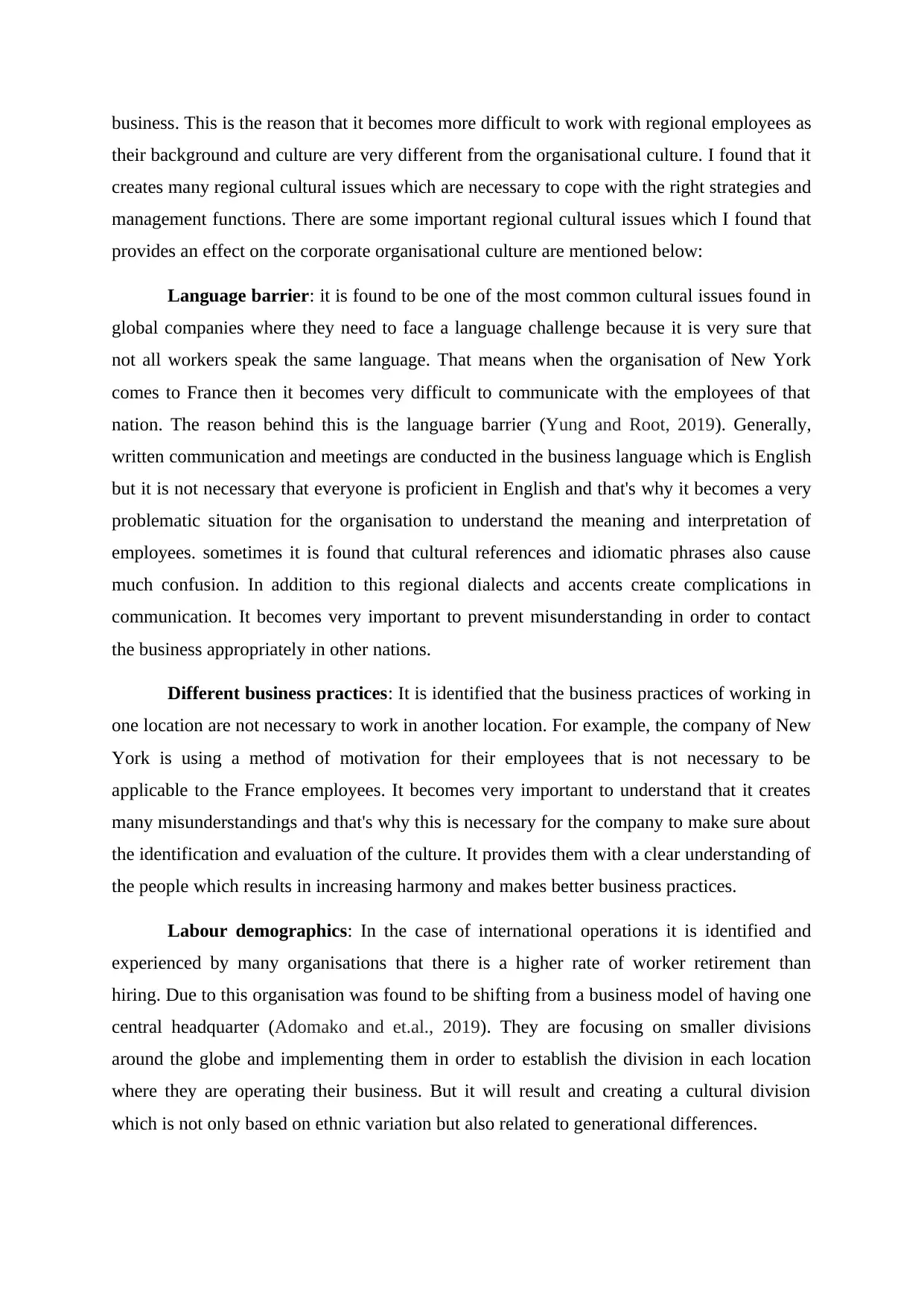
business. This is the reason that it becomes more difficult to work with regional employees as
their background and culture are very different from the organisational culture. I found that it
creates many regional cultural issues which are necessary to cope with the right strategies and
management functions. There are some important regional cultural issues which I found that
provides an effect on the corporate organisational culture are mentioned below:
Language barrier: it is found to be one of the most common cultural issues found in
global companies where they need to face a language challenge because it is very sure that
not all workers speak the same language. That means when the organisation of New York
comes to France then it becomes very difficult to communicate with the employees of that
nation. The reason behind this is the language barrier (Yung and Root, 2019). Generally,
written communication and meetings are conducted in the business language which is English
but it is not necessary that everyone is proficient in English and that's why it becomes a very
problematic situation for the organisation to understand the meaning and interpretation of
employees. sometimes it is found that cultural references and idiomatic phrases also cause
much confusion. In addition to this regional dialects and accents create complications in
communication. It becomes very important to prevent misunderstanding in order to contact
the business appropriately in other nations.
Different business practices: It is identified that the business practices of working in
one location are not necessary to work in another location. For example, the company of New
York is using a method of motivation for their employees that is not necessary to be
applicable to the France employees. It becomes very important to understand that it creates
many misunderstandings and that's why this is necessary for the company to make sure about
the identification and evaluation of the culture. It provides them with a clear understanding of
the people which results in increasing harmony and makes better business practices.
Labour demographics: In the case of international operations it is identified and
experienced by many organisations that there is a higher rate of worker retirement than
hiring. Due to this organisation was found to be shifting from a business model of having one
central headquarter (Adomako and et.al., 2019). They are focusing on smaller divisions
around the globe and implementing them in order to establish the division in each location
where they are operating their business. But it will result and creating a cultural division
which is not only based on ethnic variation but also related to generational differences.
their background and culture are very different from the organisational culture. I found that it
creates many regional cultural issues which are necessary to cope with the right strategies and
management functions. There are some important regional cultural issues which I found that
provides an effect on the corporate organisational culture are mentioned below:
Language barrier: it is found to be one of the most common cultural issues found in
global companies where they need to face a language challenge because it is very sure that
not all workers speak the same language. That means when the organisation of New York
comes to France then it becomes very difficult to communicate with the employees of that
nation. The reason behind this is the language barrier (Yung and Root, 2019). Generally,
written communication and meetings are conducted in the business language which is English
but it is not necessary that everyone is proficient in English and that's why it becomes a very
problematic situation for the organisation to understand the meaning and interpretation of
employees. sometimes it is found that cultural references and idiomatic phrases also cause
much confusion. In addition to this regional dialects and accents create complications in
communication. It becomes very important to prevent misunderstanding in order to contact
the business appropriately in other nations.
Different business practices: It is identified that the business practices of working in
one location are not necessary to work in another location. For example, the company of New
York is using a method of motivation for their employees that is not necessary to be
applicable to the France employees. It becomes very important to understand that it creates
many misunderstandings and that's why this is necessary for the company to make sure about
the identification and evaluation of the culture. It provides them with a clear understanding of
the people which results in increasing harmony and makes better business practices.
Labour demographics: In the case of international operations it is identified and
experienced by many organisations that there is a higher rate of worker retirement than
hiring. Due to this organisation was found to be shifting from a business model of having one
central headquarter (Adomako and et.al., 2019). They are focusing on smaller divisions
around the globe and implementing them in order to establish the division in each location
where they are operating their business. But it will result and creating a cultural division
which is not only based on ethnic variation but also related to generational differences.
Paraphrase This Document
Need a fresh take? Get an instant paraphrase of this document with our AI Paraphraser
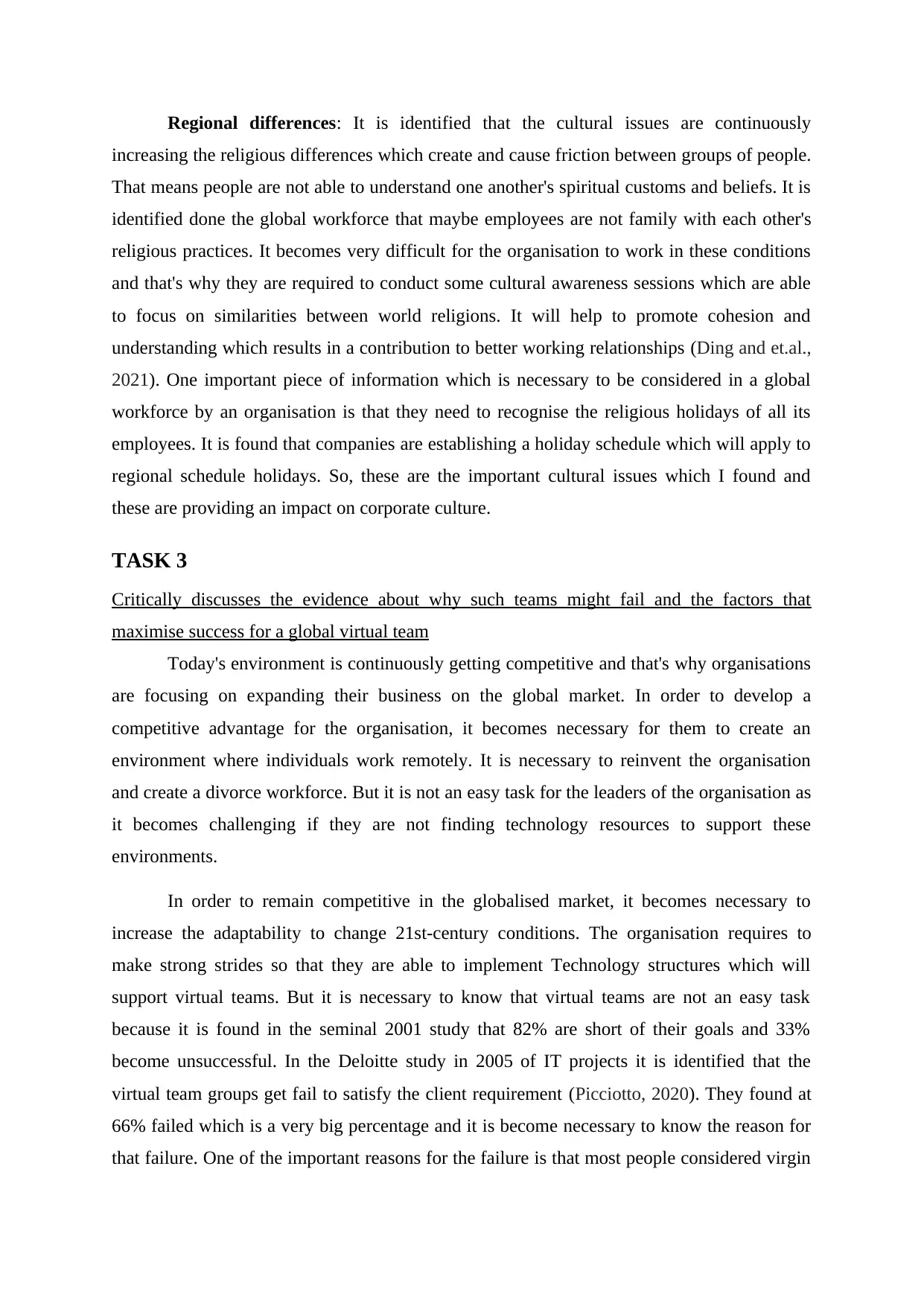
Regional differences: It is identified that the cultural issues are continuously
increasing the religious differences which create and cause friction between groups of people.
That means people are not able to understand one another's spiritual customs and beliefs. It is
identified done the global workforce that maybe employees are not family with each other's
religious practices. It becomes very difficult for the organisation to work in these conditions
and that's why they are required to conduct some cultural awareness sessions which are able
to focus on similarities between world religions. It will help to promote cohesion and
understanding which results in a contribution to better working relationships (Ding and et.al.,
2021). One important piece of information which is necessary to be considered in a global
workforce by an organisation is that they need to recognise the religious holidays of all its
employees. It is found that companies are establishing a holiday schedule which will apply to
regional schedule holidays. So, these are the important cultural issues which I found and
these are providing an impact on corporate culture.
TASK 3
Critically discusses the evidence about why such teams might fail and the factors that
maximise success for a global virtual team
Today's environment is continuously getting competitive and that's why organisations
are focusing on expanding their business on the global market. In order to develop a
competitive advantage for the organisation, it becomes necessary for them to create an
environment where individuals work remotely. It is necessary to reinvent the organisation
and create a divorce workforce. But it is not an easy task for the leaders of the organisation as
it becomes challenging if they are not finding technology resources to support these
environments.
In order to remain competitive in the globalised market, it becomes necessary to
increase the adaptability to change 21st-century conditions. The organisation requires to
make strong strides so that they are able to implement Technology structures which will
support virtual teams. But it is necessary to know that virtual teams are not an easy task
because it is found in the seminal 2001 study that 82% are short of their goals and 33%
become unsuccessful. In the Deloitte study in 2005 of IT projects it is identified that the
virtual team groups get fail to satisfy the client requirement (Picciotto, 2020). They found at
66% failed which is a very big percentage and it is become necessary to know the reason for
that failure. One of the important reasons for the failure is that most people considered virgin
increasing the religious differences which create and cause friction between groups of people.
That means people are not able to understand one another's spiritual customs and beliefs. It is
identified done the global workforce that maybe employees are not family with each other's
religious practices. It becomes very difficult for the organisation to work in these conditions
and that's why they are required to conduct some cultural awareness sessions which are able
to focus on similarities between world religions. It will help to promote cohesion and
understanding which results in a contribution to better working relationships (Ding and et.al.,
2021). One important piece of information which is necessary to be considered in a global
workforce by an organisation is that they need to recognise the religious holidays of all its
employees. It is found that companies are establishing a holiday schedule which will apply to
regional schedule holidays. So, these are the important cultural issues which I found and
these are providing an impact on corporate culture.
TASK 3
Critically discusses the evidence about why such teams might fail and the factors that
maximise success for a global virtual team
Today's environment is continuously getting competitive and that's why organisations
are focusing on expanding their business on the global market. In order to develop a
competitive advantage for the organisation, it becomes necessary for them to create an
environment where individuals work remotely. It is necessary to reinvent the organisation
and create a divorce workforce. But it is not an easy task for the leaders of the organisation as
it becomes challenging if they are not finding technology resources to support these
environments.
In order to remain competitive in the globalised market, it becomes necessary to
increase the adaptability to change 21st-century conditions. The organisation requires to
make strong strides so that they are able to implement Technology structures which will
support virtual teams. But it is necessary to know that virtual teams are not an easy task
because it is found in the seminal 2001 study that 82% are short of their goals and 33%
become unsuccessful. In the Deloitte study in 2005 of IT projects it is identified that the
virtual team groups get fail to satisfy the client requirement (Picciotto, 2020). They found at
66% failed which is a very big percentage and it is become necessary to know the reason for
that failure. One of the important reasons for the failure is that most people considered virgin
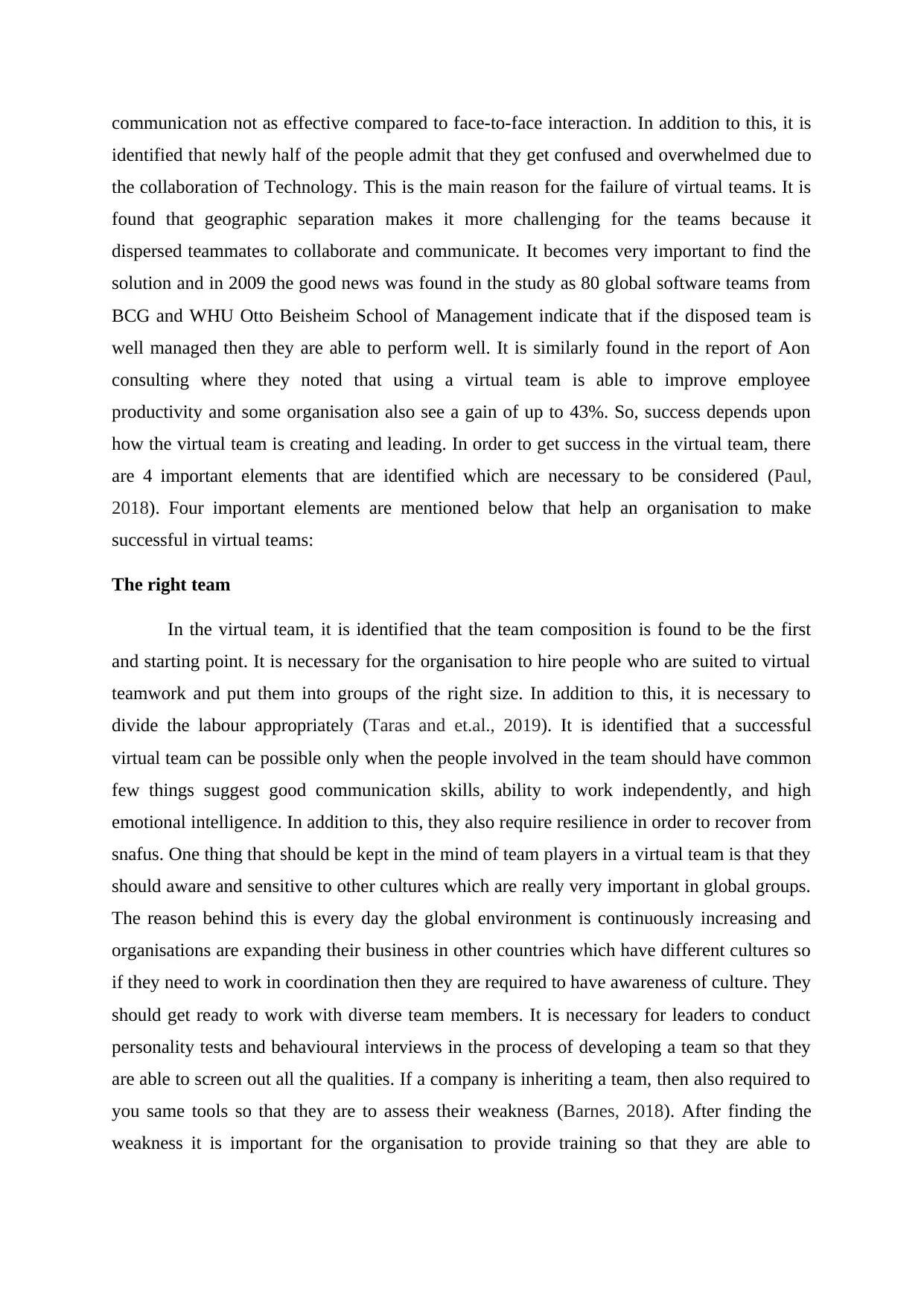
communication not as effective compared to face-to-face interaction. In addition to this, it is
identified that newly half of the people admit that they get confused and overwhelmed due to
the collaboration of Technology. This is the main reason for the failure of virtual teams. It is
found that geographic separation makes it more challenging for the teams because it
dispersed teammates to collaborate and communicate. It becomes very important to find the
solution and in 2009 the good news was found in the study as 80 global software teams from
BCG and WHU Otto Beisheim School of Management indicate that if the disposed team is
well managed then they are able to perform well. It is similarly found in the report of Aon
consulting where they noted that using a virtual team is able to improve employee
productivity and some organisation also see a gain of up to 43%. So, success depends upon
how the virtual team is creating and leading. In order to get success in the virtual team, there
are 4 important elements that are identified which are necessary to be considered (Paul,
2018). Four important elements are mentioned below that help an organisation to make
successful in virtual teams:
The right team
In the virtual team, it is identified that the team composition is found to be the first
and starting point. It is necessary for the organisation to hire people who are suited to virtual
teamwork and put them into groups of the right size. In addition to this, it is necessary to
divide the labour appropriately (Taras and et.al., 2019). It is identified that a successful
virtual team can be possible only when the people involved in the team should have common
few things suggest good communication skills, ability to work independently, and high
emotional intelligence. In addition to this, they also require resilience in order to recover from
snafus. One thing that should be kept in the mind of team players in a virtual team is that they
should aware and sensitive to other cultures which are really very important in global groups.
The reason behind this is every day the global environment is continuously increasing and
organisations are expanding their business in other countries which have different cultures so
if they need to work in coordination then they are required to have awareness of culture. They
should get ready to work with diverse team members. It is necessary for leaders to conduct
personality tests and behavioural interviews in the process of developing a team so that they
are able to screen out all the qualities. If a company is inheriting a team, then also required to
you same tools so that they are to assess their weakness (Barnes, 2018). After finding the
weakness it is important for the organisation to provide training so that they are able to
identified that newly half of the people admit that they get confused and overwhelmed due to
the collaboration of Technology. This is the main reason for the failure of virtual teams. It is
found that geographic separation makes it more challenging for the teams because it
dispersed teammates to collaborate and communicate. It becomes very important to find the
solution and in 2009 the good news was found in the study as 80 global software teams from
BCG and WHU Otto Beisheim School of Management indicate that if the disposed team is
well managed then they are able to perform well. It is similarly found in the report of Aon
consulting where they noted that using a virtual team is able to improve employee
productivity and some organisation also see a gain of up to 43%. So, success depends upon
how the virtual team is creating and leading. In order to get success in the virtual team, there
are 4 important elements that are identified which are necessary to be considered (Paul,
2018). Four important elements are mentioned below that help an organisation to make
successful in virtual teams:
The right team
In the virtual team, it is identified that the team composition is found to be the first
and starting point. It is necessary for the organisation to hire people who are suited to virtual
teamwork and put them into groups of the right size. In addition to this, it is necessary to
divide the labour appropriately (Taras and et.al., 2019). It is identified that a successful
virtual team can be possible only when the people involved in the team should have common
few things suggest good communication skills, ability to work independently, and high
emotional intelligence. In addition to this, they also require resilience in order to recover from
snafus. One thing that should be kept in the mind of team players in a virtual team is that they
should aware and sensitive to other cultures which are really very important in global groups.
The reason behind this is every day the global environment is continuously increasing and
organisations are expanding their business in other countries which have different cultures so
if they need to work in coordination then they are required to have awareness of culture. They
should get ready to work with diverse team members. It is necessary for leaders to conduct
personality tests and behavioural interviews in the process of developing a team so that they
are able to screen out all the qualities. If a company is inheriting a team, then also required to
you same tools so that they are to assess their weakness (Barnes, 2018). After finding the
weakness it is important for the organisation to provide training so that they are able to
⊘ This is a preview!⊘
Do you want full access?
Subscribe today to unlock all pages.

Trusted by 1+ million students worldwide
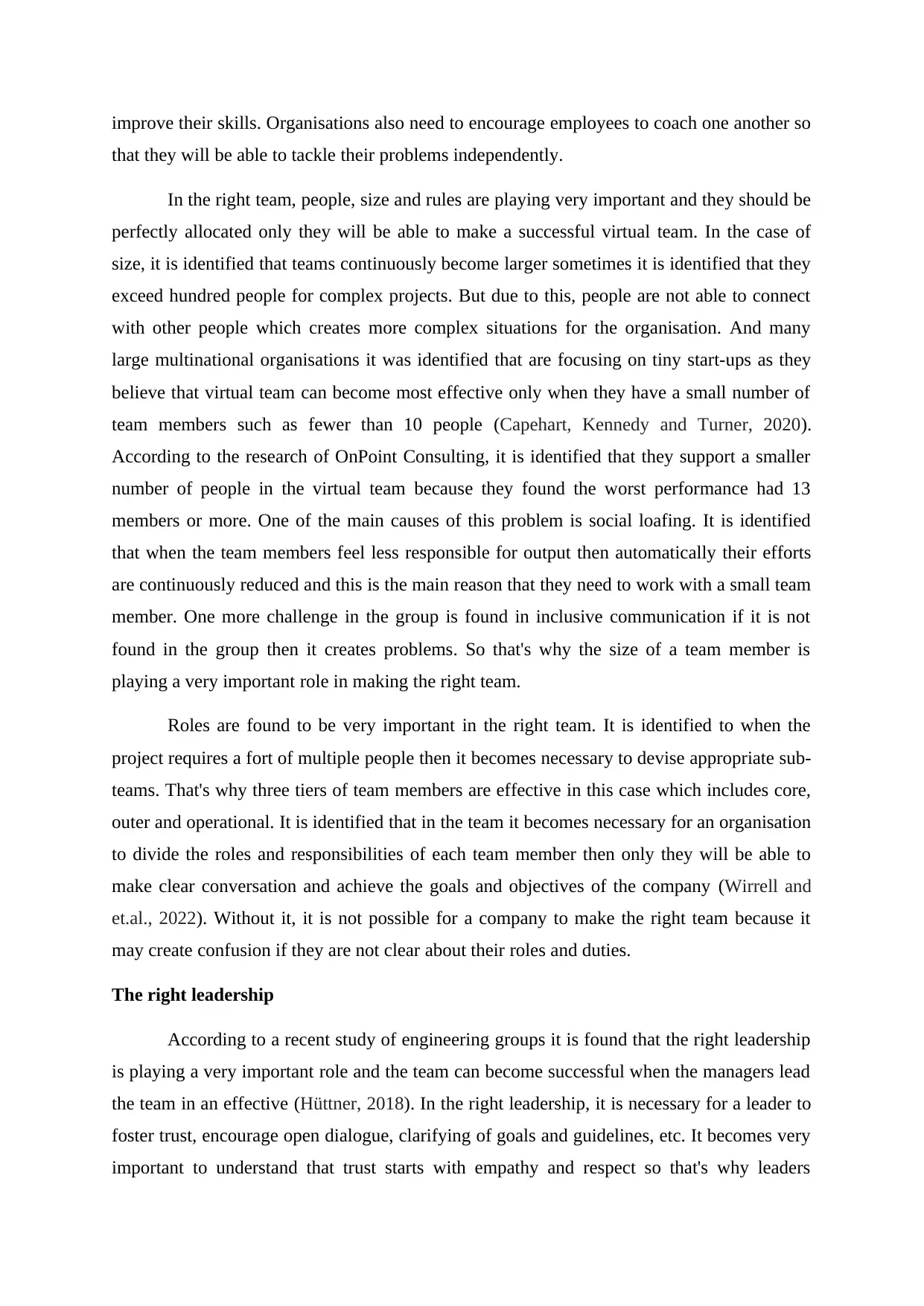
improve their skills. Organisations also need to encourage employees to coach one another so
that they will be able to tackle their problems independently.
In the right team, people, size and rules are playing very important and they should be
perfectly allocated only they will be able to make a successful virtual team. In the case of
size, it is identified that teams continuously become larger sometimes it is identified that they
exceed hundred people for complex projects. But due to this, people are not able to connect
with other people which creates more complex situations for the organisation. And many
large multinational organisations it was identified that are focusing on tiny start-ups as they
believe that virtual team can become most effective only when they have a small number of
team members such as fewer than 10 people (Capehart, Kennedy and Turner, 2020).
According to the research of OnPoint Consulting, it is identified that they support a smaller
number of people in the virtual team because they found the worst performance had 13
members or more. One of the main causes of this problem is social loafing. It is identified
that when the team members feel less responsible for output then automatically their efforts
are continuously reduced and this is the main reason that they need to work with a small team
member. One more challenge in the group is found in inclusive communication if it is not
found in the group then it creates problems. So that's why the size of a team member is
playing a very important role in making the right team.
Roles are found to be very important in the right team. It is identified to when the
project requires a fort of multiple people then it becomes necessary to devise appropriate sub-
teams. That's why three tiers of team members are effective in this case which includes core,
outer and operational. It is identified that in the team it becomes necessary for an organisation
to divide the roles and responsibilities of each team member then only they will be able to
make clear conversation and achieve the goals and objectives of the company (Wirrell and
et.al., 2022). Without it, it is not possible for a company to make the right team because it
may create confusion if they are not clear about their roles and duties.
The right leadership
According to a recent study of engineering groups it is found that the right leadership
is playing a very important role and the team can become successful when the managers lead
the team in an effective (Hüttner, 2018). In the right leadership, it is necessary for a leader to
foster trust, encourage open dialogue, clarifying of goals and guidelines, etc. It becomes very
important to understand that trust starts with empathy and respect so that's why leaders
that they will be able to tackle their problems independently.
In the right team, people, size and rules are playing very important and they should be
perfectly allocated only they will be able to make a successful virtual team. In the case of
size, it is identified that teams continuously become larger sometimes it is identified that they
exceed hundred people for complex projects. But due to this, people are not able to connect
with other people which creates more complex situations for the organisation. And many
large multinational organisations it was identified that are focusing on tiny start-ups as they
believe that virtual team can become most effective only when they have a small number of
team members such as fewer than 10 people (Capehart, Kennedy and Turner, 2020).
According to the research of OnPoint Consulting, it is identified that they support a smaller
number of people in the virtual team because they found the worst performance had 13
members or more. One of the main causes of this problem is social loafing. It is identified
that when the team members feel less responsible for output then automatically their efforts
are continuously reduced and this is the main reason that they need to work with a small team
member. One more challenge in the group is found in inclusive communication if it is not
found in the group then it creates problems. So that's why the size of a team member is
playing a very important role in making the right team.
Roles are found to be very important in the right team. It is identified to when the
project requires a fort of multiple people then it becomes necessary to devise appropriate sub-
teams. That's why three tiers of team members are effective in this case which includes core,
outer and operational. It is identified that in the team it becomes necessary for an organisation
to divide the roles and responsibilities of each team member then only they will be able to
make clear conversation and achieve the goals and objectives of the company (Wirrell and
et.al., 2022). Without it, it is not possible for a company to make the right team because it
may create confusion if they are not clear about their roles and duties.
The right leadership
According to a recent study of engineering groups it is found that the right leadership
is playing a very important role and the team can become successful when the managers lead
the team in an effective (Hüttner, 2018). In the right leadership, it is necessary for a leader to
foster trust, encourage open dialogue, clarifying of goals and guidelines, etc. It becomes very
important to understand that trust starts with empathy and respect so that's why leaders
Paraphrase This Document
Need a fresh take? Get an instant paraphrase of this document with our AI Paraphraser
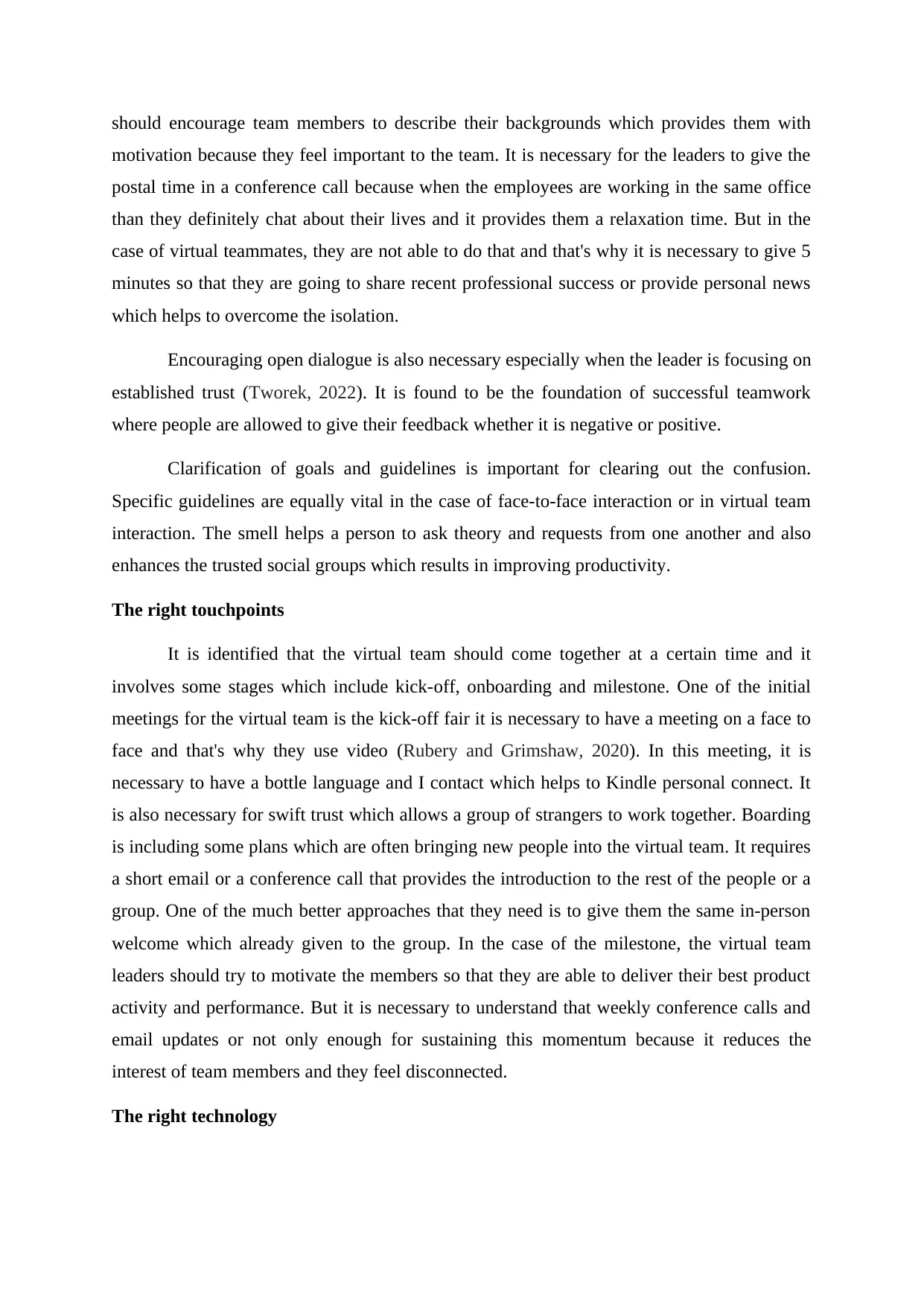
should encourage team members to describe their backgrounds which provides them with
motivation because they feel important to the team. It is necessary for the leaders to give the
postal time in a conference call because when the employees are working in the same office
than they definitely chat about their lives and it provides them a relaxation time. But in the
case of virtual teammates, they are not able to do that and that's why it is necessary to give 5
minutes so that they are going to share recent professional success or provide personal news
which helps to overcome the isolation.
Encouraging open dialogue is also necessary especially when the leader is focusing on
established trust (Tworek, 2022). It is found to be the foundation of successful teamwork
where people are allowed to give their feedback whether it is negative or positive.
Clarification of goals and guidelines is important for clearing out the confusion.
Specific guidelines are equally vital in the case of face-to-face interaction or in virtual team
interaction. The smell helps a person to ask theory and requests from one another and also
enhances the trusted social groups which results in improving productivity.
The right touchpoints
It is identified that the virtual team should come together at a certain time and it
involves some stages which include kick-off, onboarding and milestone. One of the initial
meetings for the virtual team is the kick-off fair it is necessary to have a meeting on a face to
face and that's why they use video (Rubery and Grimshaw, 2020). In this meeting, it is
necessary to have a bottle language and I contact which helps to Kindle personal connect. It
is also necessary for swift trust which allows a group of strangers to work together. Boarding
is including some plans which are often bringing new people into the virtual team. It requires
a short email or a conference call that provides the introduction to the rest of the people or a
group. One of the much better approaches that they need is to give them the same in-person
welcome which already given to the group. In the case of the milestone, the virtual team
leaders should try to motivate the members so that they are able to deliver their best product
activity and performance. But it is necessary to understand that weekly conference calls and
email updates or not only enough for sustaining this momentum because it reduces the
interest of team members and they feel disconnected.
The right technology
motivation because they feel important to the team. It is necessary for the leaders to give the
postal time in a conference call because when the employees are working in the same office
than they definitely chat about their lives and it provides them a relaxation time. But in the
case of virtual teammates, they are not able to do that and that's why it is necessary to give 5
minutes so that they are going to share recent professional success or provide personal news
which helps to overcome the isolation.
Encouraging open dialogue is also necessary especially when the leader is focusing on
established trust (Tworek, 2022). It is found to be the foundation of successful teamwork
where people are allowed to give their feedback whether it is negative or positive.
Clarification of goals and guidelines is important for clearing out the confusion.
Specific guidelines are equally vital in the case of face-to-face interaction or in virtual team
interaction. The smell helps a person to ask theory and requests from one another and also
enhances the trusted social groups which results in improving productivity.
The right touchpoints
It is identified that the virtual team should come together at a certain time and it
involves some stages which include kick-off, onboarding and milestone. One of the initial
meetings for the virtual team is the kick-off fair it is necessary to have a meeting on a face to
face and that's why they use video (Rubery and Grimshaw, 2020). In this meeting, it is
necessary to have a bottle language and I contact which helps to Kindle personal connect. It
is also necessary for swift trust which allows a group of strangers to work together. Boarding
is including some plans which are often bringing new people into the virtual team. It requires
a short email or a conference call that provides the introduction to the rest of the people or a
group. One of the much better approaches that they need is to give them the same in-person
welcome which already given to the group. In the case of the milestone, the virtual team
leaders should try to motivate the members so that they are able to deliver their best product
activity and performance. But it is necessary to understand that weekly conference calls and
email updates or not only enough for sustaining this momentum because it reduces the
interest of team members and they feel disconnected.
The right technology
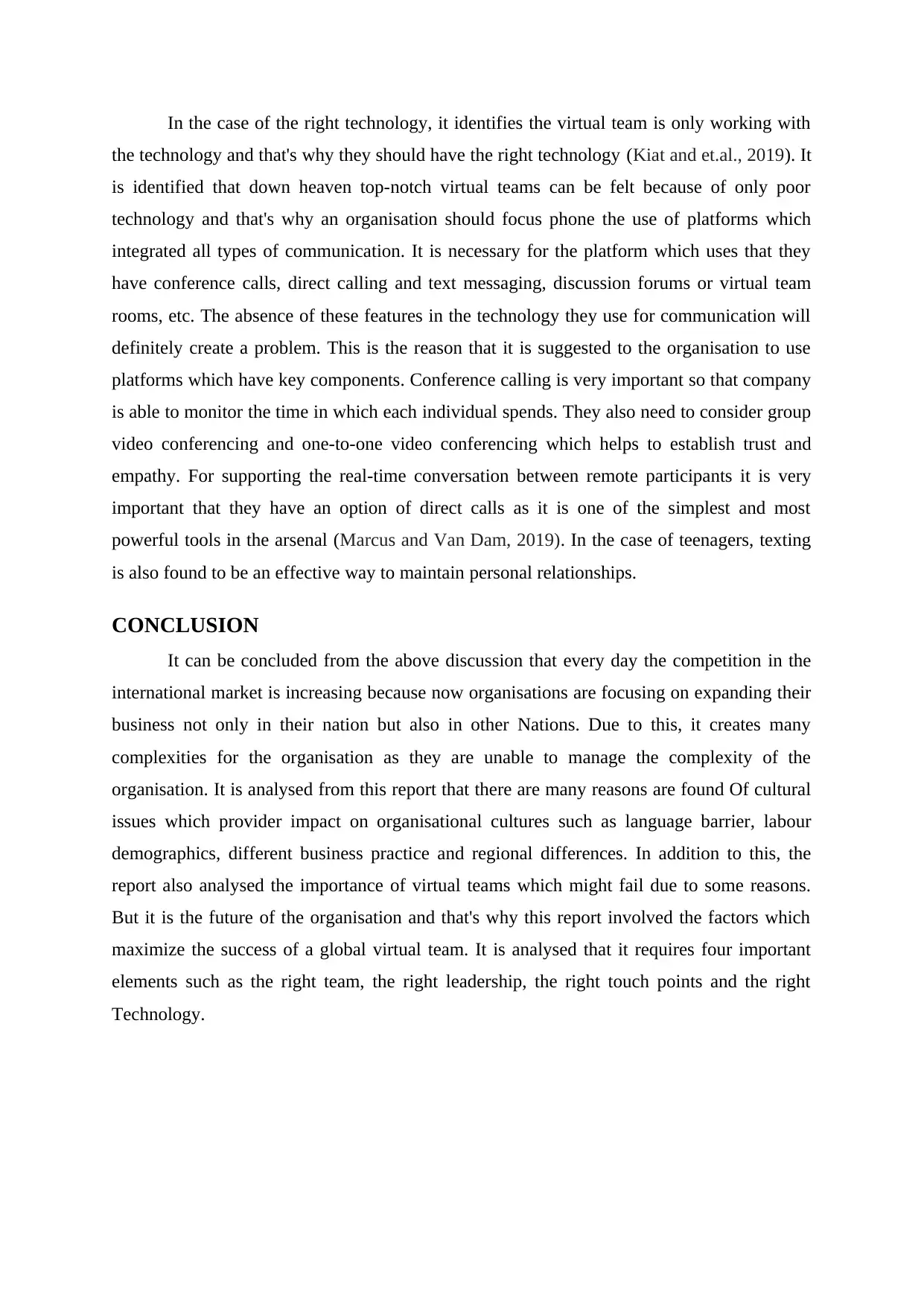
In the case of the right technology, it identifies the virtual team is only working with
the technology and that's why they should have the right technology (Kiat and et.al., 2019). It
is identified that down heaven top-notch virtual teams can be felt because of only poor
technology and that's why an organisation should focus phone the use of platforms which
integrated all types of communication. It is necessary for the platform which uses that they
have conference calls, direct calling and text messaging, discussion forums or virtual team
rooms, etc. The absence of these features in the technology they use for communication will
definitely create a problem. This is the reason that it is suggested to the organisation to use
platforms which have key components. Conference calling is very important so that company
is able to monitor the time in which each individual spends. They also need to consider group
video conferencing and one-to-one video conferencing which helps to establish trust and
empathy. For supporting the real-time conversation between remote participants it is very
important that they have an option of direct calls as it is one of the simplest and most
powerful tools in the arsenal (Marcus and Van Dam, 2019). In the case of teenagers, texting
is also found to be an effective way to maintain personal relationships.
CONCLUSION
It can be concluded from the above discussion that every day the competition in the
international market is increasing because now organisations are focusing on expanding their
business not only in their nation but also in other Nations. Due to this, it creates many
complexities for the organisation as they are unable to manage the complexity of the
organisation. It is analysed from this report that there are many reasons are found Of cultural
issues which provider impact on organisational cultures such as language barrier, labour
demographics, different business practice and regional differences. In addition to this, the
report also analysed the importance of virtual teams which might fail due to some reasons.
But it is the future of the organisation and that's why this report involved the factors which
maximize the success of a global virtual team. It is analysed that it requires four important
elements such as the right team, the right leadership, the right touch points and the right
Technology.
the technology and that's why they should have the right technology (Kiat and et.al., 2019). It
is identified that down heaven top-notch virtual teams can be felt because of only poor
technology and that's why an organisation should focus phone the use of platforms which
integrated all types of communication. It is necessary for the platform which uses that they
have conference calls, direct calling and text messaging, discussion forums or virtual team
rooms, etc. The absence of these features in the technology they use for communication will
definitely create a problem. This is the reason that it is suggested to the organisation to use
platforms which have key components. Conference calling is very important so that company
is able to monitor the time in which each individual spends. They also need to consider group
video conferencing and one-to-one video conferencing which helps to establish trust and
empathy. For supporting the real-time conversation between remote participants it is very
important that they have an option of direct calls as it is one of the simplest and most
powerful tools in the arsenal (Marcus and Van Dam, 2019). In the case of teenagers, texting
is also found to be an effective way to maintain personal relationships.
CONCLUSION
It can be concluded from the above discussion that every day the competition in the
international market is increasing because now organisations are focusing on expanding their
business not only in their nation but also in other Nations. Due to this, it creates many
complexities for the organisation as they are unable to manage the complexity of the
organisation. It is analysed from this report that there are many reasons are found Of cultural
issues which provider impact on organisational cultures such as language barrier, labour
demographics, different business practice and regional differences. In addition to this, the
report also analysed the importance of virtual teams which might fail due to some reasons.
But it is the future of the organisation and that's why this report involved the factors which
maximize the success of a global virtual team. It is analysed that it requires four important
elements such as the right team, the right leadership, the right touch points and the right
Technology.
⊘ This is a preview!⊘
Do you want full access?
Subscribe today to unlock all pages.

Trusted by 1+ million students worldwide
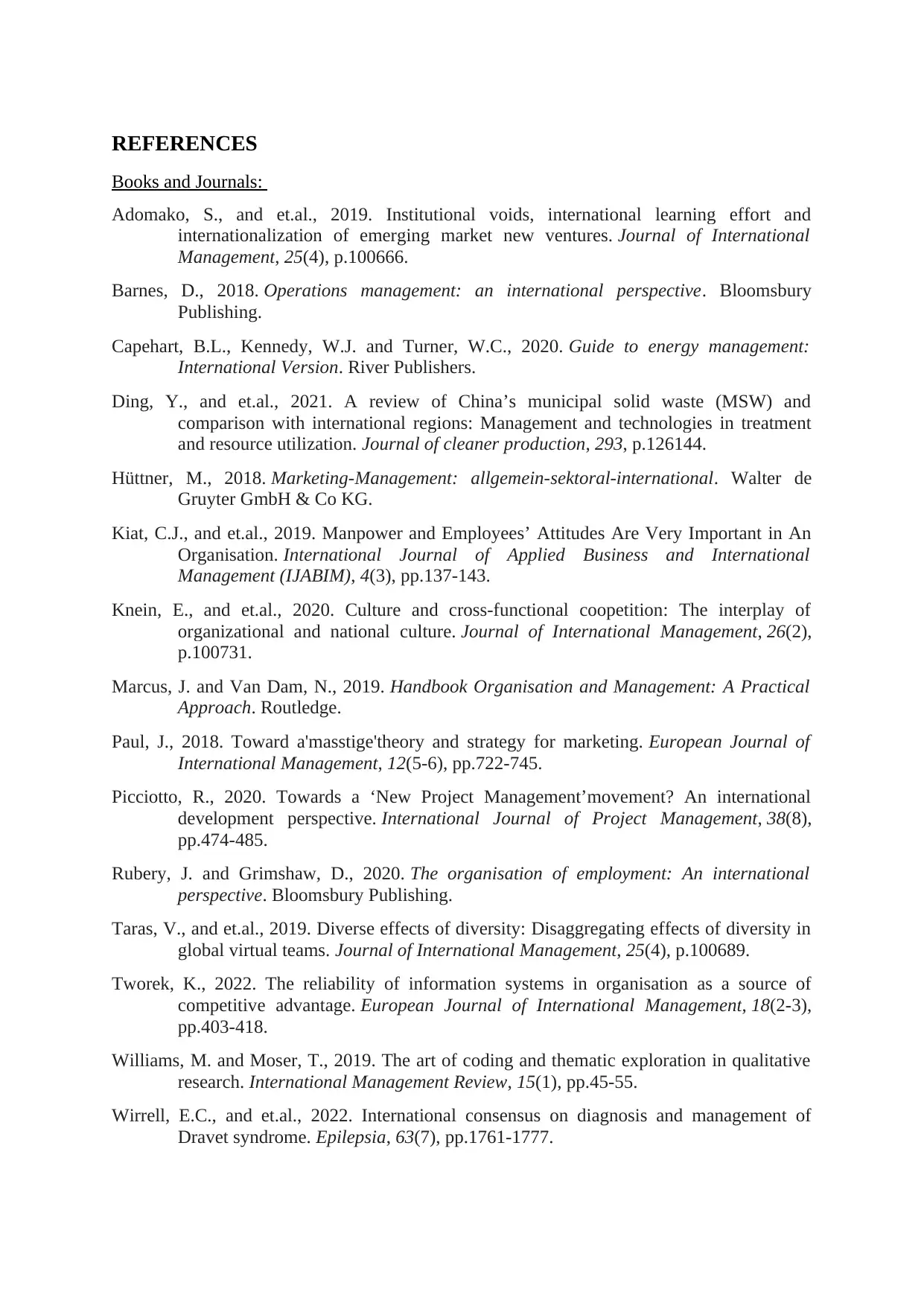
REFERENCES
Books and Journals:
Adomako, S., and et.al., 2019. Institutional voids, international learning effort and
internationalization of emerging market new ventures. Journal of International
Management, 25(4), p.100666.
Barnes, D., 2018. Operations management: an international perspective. Bloomsbury
Publishing.
Capehart, B.L., Kennedy, W.J. and Turner, W.C., 2020. Guide to energy management:
International Version. River Publishers.
Ding, Y., and et.al., 2021. A review of China’s municipal solid waste (MSW) and
comparison with international regions: Management and technologies in treatment
and resource utilization. Journal of cleaner production, 293, p.126144.
Hüttner, M., 2018. Marketing-Management: allgemein-sektoral-international. Walter de
Gruyter GmbH & Co KG.
Kiat, C.J., and et.al., 2019. Manpower and Employees’ Attitudes Are Very Important in An
Organisation. International Journal of Applied Business and International
Management (IJABIM), 4(3), pp.137-143.
Knein, E., and et.al., 2020. Culture and cross-functional coopetition: The interplay of
organizational and national culture. Journal of International Management, 26(2),
p.100731.
Marcus, J. and Van Dam, N., 2019. Handbook Organisation and Management: A Practical
Approach. Routledge.
Paul, J., 2018. Toward a'masstige'theory and strategy for marketing. European Journal of
International Management, 12(5-6), pp.722-745.
Picciotto, R., 2020. Towards a ‘New Project Management’movement? An international
development perspective. International Journal of Project Management, 38(8),
pp.474-485.
Rubery, J. and Grimshaw, D., 2020. The organisation of employment: An international
perspective. Bloomsbury Publishing.
Taras, V., and et.al., 2019. Diverse effects of diversity: Disaggregating effects of diversity in
global virtual teams. Journal of International Management, 25(4), p.100689.
Tworek, K., 2022. The reliability of information systems in organisation as a source of
competitive advantage. European Journal of International Management, 18(2-3),
pp.403-418.
Williams, M. and Moser, T., 2019. The art of coding and thematic exploration in qualitative
research. International Management Review, 15(1), pp.45-55.
Wirrell, E.C., and et.al., 2022. International consensus on diagnosis and management of
Dravet syndrome. Epilepsia, 63(7), pp.1761-1777.
Books and Journals:
Adomako, S., and et.al., 2019. Institutional voids, international learning effort and
internationalization of emerging market new ventures. Journal of International
Management, 25(4), p.100666.
Barnes, D., 2018. Operations management: an international perspective. Bloomsbury
Publishing.
Capehart, B.L., Kennedy, W.J. and Turner, W.C., 2020. Guide to energy management:
International Version. River Publishers.
Ding, Y., and et.al., 2021. A review of China’s municipal solid waste (MSW) and
comparison with international regions: Management and technologies in treatment
and resource utilization. Journal of cleaner production, 293, p.126144.
Hüttner, M., 2018. Marketing-Management: allgemein-sektoral-international. Walter de
Gruyter GmbH & Co KG.
Kiat, C.J., and et.al., 2019. Manpower and Employees’ Attitudes Are Very Important in An
Organisation. International Journal of Applied Business and International
Management (IJABIM), 4(3), pp.137-143.
Knein, E., and et.al., 2020. Culture and cross-functional coopetition: The interplay of
organizational and national culture. Journal of International Management, 26(2),
p.100731.
Marcus, J. and Van Dam, N., 2019. Handbook Organisation and Management: A Practical
Approach. Routledge.
Paul, J., 2018. Toward a'masstige'theory and strategy for marketing. European Journal of
International Management, 12(5-6), pp.722-745.
Picciotto, R., 2020. Towards a ‘New Project Management’movement? An international
development perspective. International Journal of Project Management, 38(8),
pp.474-485.
Rubery, J. and Grimshaw, D., 2020. The organisation of employment: An international
perspective. Bloomsbury Publishing.
Taras, V., and et.al., 2019. Diverse effects of diversity: Disaggregating effects of diversity in
global virtual teams. Journal of International Management, 25(4), p.100689.
Tworek, K., 2022. The reliability of information systems in organisation as a source of
competitive advantage. European Journal of International Management, 18(2-3),
pp.403-418.
Williams, M. and Moser, T., 2019. The art of coding and thematic exploration in qualitative
research. International Management Review, 15(1), pp.45-55.
Wirrell, E.C., and et.al., 2022. International consensus on diagnosis and management of
Dravet syndrome. Epilepsia, 63(7), pp.1761-1777.
Paraphrase This Document
Need a fresh take? Get an instant paraphrase of this document with our AI Paraphraser

Yung, K. and Root, A., 2019. Policy uncertainty and earnings management: International
evidence. Journal of Business Research, 100, pp.255-267.
evidence. Journal of Business Research, 100, pp.255-267.
1 out of 11
Related Documents
Your All-in-One AI-Powered Toolkit for Academic Success.
+13062052269
info@desklib.com
Available 24*7 on WhatsApp / Email
![[object Object]](/_next/static/media/star-bottom.7253800d.svg)
Unlock your academic potential
Copyright © 2020–2026 A2Z Services. All Rights Reserved. Developed and managed by ZUCOL.




